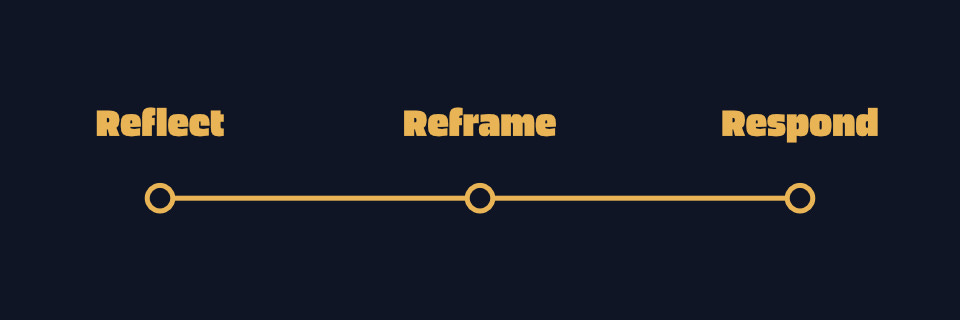Reframing: Often Overlooked, Yet Powerful
Today, you will learn how reframing your thoughts can completely change your perspective.
We are often told to push away negative thoughts and focus on the positive. However, these thoughts are important signals from our body. We need to learn how to navigate them in a productive way, instead of blindly pushing unwanted thoughts away.
Thoughts, positive or negative, have a right to be there. It's up to us to see them for what they are and act as we think is right.
The strategy we're going over today will help you:
Navigate through decisions in stressful situations
Find ways to avoid acting upon unwanted thoughts
Change your perspective on behaviour you want to change
It all begins with…
I come back to this topic again and again. Awareness is the underlying principle for all that we want to change.
Without awareness, we can not realise that we act in an unwanted way.
Without awareness, we can not realise that we are doing great.
Without awareness, we can not harness the energy from our emotions.
Without awareness, we can not practice productive self-talk.
Why is this the case?
Our mind surfaces thoughts. These thoughts come from our subconscious. Our subconscious collects information from our body. It analyses what would be a reasonable thought to have based on past experiences. Essentially, what worked in the past.
This thought now pops into your consciousness, raising an emotion. Based on this emotion, most of us act.
Emotion in, behaviour out.
At this point, we need to implement a buffer between the incoming emotion and the outgoing behavior. We need to learn to have an emotion or thought, live with it, and then act in a way we think would be productive, without judging the initial thought.
Have you ever stepped to the edge of a cliff and suddenly a thought popped into your head, asking yourself what would happen if you jumped? We naturally know not to act upon those intrusive thoughts.
What if the thought is more nuanced? If you experience a significant low during your ultra race and your mind suggests that you could just quit, you might start to entertain the thought.
This thought has a high potential that you will act on it, even though your intention at the start was to finish. Under normal circumstances, you would understand that lows are part of the game. In the midst of stress, your mind is clouded.
Productive Mindfulness
Not acting directly upon our thoughts or emotions isn't as easy as it sounds. Under pressure, it's hard to behave as we want. We need to reach a conclusion quickly. There's no time to ponder for hours over a decision.
The situation requires action right now.
When you are faced with a setback, your mind can start to spin. An initial thought of "oh no, this is not good," when your legs cramp, can spiral all the way to thoughts of quitting.
Catching ourselves early in this process is an important skill to have in our mental toolbox.
How can we catch ourselves? I think you know the answer. Yes, awareness.
Step 1: Reflect to Become Aware of the Source
When a thought pops into your head during a stressful situation, you need to ask yourself several questions. You reflect.
What emotion is present now?
Is the thought grounded in my emotion?
What underlying feeling do I have based on the emotion?
What triggered the thought?
You need to approach your thoughts with curiosity. We are trying to dissect what is happening. Without seeing the full canvas, you can only argue about one brush stroke.
Catching yourself in the situation and trying to find answers to these questions is difficult. It's best to try to incorporate this into your daily life. Try to become more aware of how you feel throughout the day. Notice how your thoughts change with your mood. Realise that becoming aware of this fact also changes your view on those thoughts.
You might find that you distance yourself from those thoughts. You can reason why the thought popped up. In the end, as we already learned, your thoughts are just triggers from your subconscious.
Step 2: Reframe Your Thought
Armed with knowledge about our underlying feelings and emotional states, we can start to reframe our thoughts. Under pressure, we have all kinds of thoughts. Our mind is constantly evaluating if we can achieve what we set out to do.
If you are starting to feel exhausted, it is normal to worry about keeping the pace until the finish line. With the awareness we build, we should be able to find out what the underlying emotion is and where it comes from.
Let’s assume it’s fear.
Fear of not reaching the finish line. Fear of not achieving the time we wanted. By being aware of this fear, we can start to reframe it. What productive perspective can you find?
You can reframe your fear by accepting that your goal will not come easily. You have to push for it, and it requires feeling exhausted. Without this exhaustion, you would not be happy at the finish line. You might think you could have gone faster.
You've reframed how you view fear. You accept it as part of the process. You've shifted your mindset from fearing failure to seeing fear as a component of success.
Do you see how powerful the new thought is? And how it didn't push the fear away?
Reframing involves adopting new perspectives. It's about finding positives in negatives without dismissing the underlying emotion. I have found reframing to be helpful in all kinds of life situations.
My struggle with negative self-talk was something I viewed with shame. After reframing, I can now only see it from a perspective of hidden potential. I was (and still am) talking myself down so often, that when it happens now, I am reminded of the opportunity to grow. Every negative thought is a reminder of potential growth. From my perspective, the potential is unlimited.
Step 3: Respond to Your Thoughts
We became aware. We reframed our thoughts. Now we can act.
Having built an understanding of the relationship between fear and success, it can fuel the rest of your run.
Do you feel fear arising? Now, take it as an indicator that you are in exactly the right spot! Perhaps you even want to exert that last bit of effort. How closely can you ride on the edge of fear?
How you reframe your thoughts and act on them is very personal. I've chosen an example that I believe everyone can understand. It may not resonate with you, but you can see the difference between the initial thought and the final action.
Before: Feeling exhausted → Slowing down
After: Feeling exhausted → Fear of not reaching the finish line → Reframing fear as a key indicator for success → keeping your pace, or unlocking your last gear
Do you see the power of our two new steps? Becoming aware of your emotions is essential to reframing your initial feelings. Without this awareness, you can only get so far.
To decide not to act is also to act
I have one important caveat to mention at this point. Just because a thought comes into your mind does not mean that you have to act on it.
At each step, it could happen that you realize you do not need to entertain the thought.
Realizing early on that your thought is not rooted in truth? Dismiss it.
Realizing during the reframing process that it does not resonate with you? Dismiss it.
Realizing that there is no real way to act upon it? Dismiss it.
Your mind is telling you to slow down.
Based on your perceived effort, you have more in the tank. You don’t need to listen to the thought. There's no need to reframe or act upon it.
You often find that in some sense, you reframe this thought nonetheless. A quick "No, I still feel good, no need to slow down" is reframing. You would just not act on it.
You can only decide not to act on each step when you have practiced awareness and reframing. It is quite normal that we have thoughts which, when we look at them, do not make sense.
Conclusion
By becoming aware of our thoughts, we gain the ability to act productively. Even under pressure, we can learn to navigate ourselves.
This is by no means an easy task. It will require dedication to remind ourselves to practice awareness. To this day, I am still struggling with being aware. But by being aware that I struggle, I am aware. Awareness is a strange thing.
Reframing is powerful. It can help you in everyday situations. It can save you in a low moment. It can open up new perspectives on your existing behavior.
Practice these steps to use it effectively.
Step 1: Reflect
Step 2: Reframe
Step 3: Respond
I hope you enjoyed today's letter and took something from it.
If you know someone who could benefit from reframing, send it their way. I would appreciate it very much.
Until next time.





